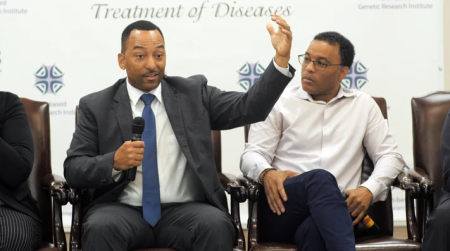Researchers partner with faith leaders to promote gene therapy in communities of color

A group of faith leaders and research scientists have partnered to create a nonprofit organization called The Faith Based Genetic Research Institute in a bid to promote the value of gene therapy in communities of color.
Tshaka Cunningham, the executive director of the organization, is also co-founder and chief scientific officer of TruGenomix, a precision behavioral health company advancing the diagnosis and treatment of PTSD through TruGen-1, a patented genomic biomarker assay, and the TruGenomix Platform, an evidence-based decision support tool.
Last Thursday, during a STAT Summit panel with Anne Wojcicki, chief executive of 23andMe, and Tony Coles, chief executive of Cerevel Therapeutics, Cunningham highlighted how the Tuskegee trial helped break the trust between the medical and black communities and how his organization is looking to use “honest brokers” to bridge the gap.
“You talk about the African American community, there are psychological scars there with regard to the healthcare system going all the way back to Tuskegee,” Cunningham said.
From 1932 through 1972, the U.S. Public Health Service conducted a study of the effects of untreated syphilis in black men in Macon County, Alabama. The men in the study were offered free medical care and burials, but not penicillin, which became the recommended drug for treatment of syphilis in the 1940s.
Cunningham, who has served as a deacon at the historic Alfred Street Baptist Church, said he and his organization have been promoting the benefits of gene therapy to people of color through members of their communities who are also members of the medical community.
“I’m a trusted source of information,” Cunningham said at the summit. “I’ve become an honest broker for the community about what is genomics, what is health, what is this technology.”
The organization cited studies showing that African Americans are grossly under-represented in pharmacogenomic studies and trials which leads to widening health disparities.
“This philosophy of honest brokers [is] making sure people of color are not only just at the table,” said Cunningham. “We’re eating, we’re determining what’s on the menu, we’re determining what’s being served, and we’re cooking too.”
The Faith Based Genetic Research Institute has undertaken a five-year plan to promote gene therapy across the country through town hall style meetings, according to its website. In addition to using surveys to track their progress, they will also create a database for use in selecting individuals for medical trials.
“Having members of minority communities participate in the scientific and business aspects of precision medicine and gene therapy will ultimately contribute greatly to overall participation, increased trust and solid medical outcomes for the community,” the organization explained.
Faith communities have long played a key role in rebuilding trust between the medical researchers and communities of color.
At the National Medical Association's virtual annual convention earlier this year, past and present U.S. surgeons general said vaccine hesitancy in the black community could worsen the disproportionate impact of COVID-19.
Latinos and non-Hispanic black individuals are hospitalized for COVID-19 at a rate that is 4.7 times higher than the rate of non-Hispanic white people, according to the Centers for Disease Control and Prevention.
David Satcher, former surgeon general in the Clinton administration, said during his time with HHS, the government partnered with a national group of black churches to promote immunizations in children before age 2. At the time, immunization rates were below 30% overall and lower in the black community.
"People are not going to necessarily always trust us, but they might trust the church," he said. "So that's what we took advantage of, and it worked out quite well."






















